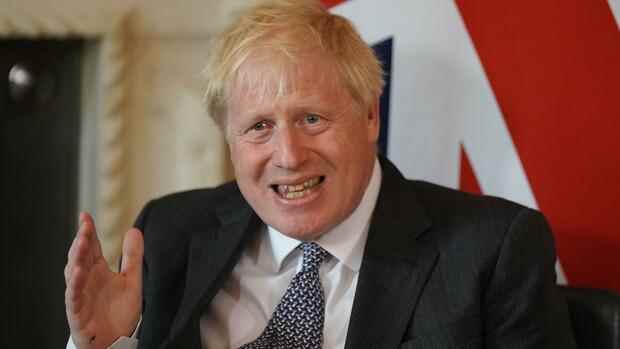London/Brussels. The dispute between Great Britain and the EU over the customs border in Northern Ireland is intensifying. The UK government has now tabled legislation that would allow its ministers to override key agreements in the Brexit treaty’s so-called “Northern Ireland Protocol”.
British Foreign Secretary Liz Truss called the proposed changes a “reasonable and practical solution to the problems in Northern Ireland”. There can only be a negotiated solution if the EU moves, said the Tory politician. However, that is not the case at the moment.
Prime Minister Boris Johnson had previously described the planned changes as “trivial”. At the same time, he defended himself against the accusation that his government was breaking international law with its initiative: “We are only trying to achieve some bureaucratic simplifications between Great Britain and Northern Ireland,” emphasized Johnson.
In fact, however, the law contains far-reaching powers to unilaterally suspend entire parts of the protocol. In London, this is seen as a concession to the tough Brexit supporters in the governing Tories.
Irish Foreign Minister Simon Coveney branded the British move as a breach of the Brexit Treaty in a telephone call to his London counterpart on Monday morning. The bill was “deeply damaging” for relations in the British Isles. Coveney spoke of a “new “low” between London and Brussels.
Criticism is also likely to come from Washington. US President Joe Biden had warned Johnson against unilaterally terminating the agreement with the EU.
The EU has threatened a trade war against London if the initiative is passed by a majority in both houses of the British Parliament.
The EU does not want to react immediately with sanctions
However, a parliamentary majority for the government draft is not certain, as the breach of contract is also highly controversial in the conservative party. Former European Commissioner Lord Chris Patten called the government’s proposal “completely insane”.
The EU Commission is therefore initially concerned with de-escalation. Since the draft law is only just beginning in Great Britain, she does not want to react immediately with sanctions. Instead, for the time being, only consideration is being given to resuming the infringement proceedings against Great Britain that have been put on hold.
A freight truck leaves the Port of Belfast.
(Photo: dpa)
The trade dispute comes at a sensitive time, particularly for Britain. In April, the British economy surprisingly contracted. At the same time, the rapidly rising inflation is moving towards ten percent. Rain Newton-Smith, chief economist at the British industry association CBI, warned against further straining trade relations with the EU in view of the precarious economic situation.
In a first reaction, the Commission Vice President responsible, Maros Sefcovic, said that a unilateral approach to the Northern Ireland Protocol had no future. You have to find a solution together. Sefcovic also promised further simplifications in border controls.
After Brexit, it was initially assumed that there was a high risk that British goods would enter the internal market via Northern Ireland, according to Brussels. The controls were applied accordingly strictly. Now the EU has more experience of what trade between Great Britain and Northern Ireland actually looks like. Therefore, the controls can be relaxed further.
A “very destructive decision”
The recent British breach of contract was also condemned in the European Parliament. This is a “very destructive decision” by Boris Johnson’s government, said Internal Market Committee Chair Anna Cavazzini (Greens).
The chairman of the Foreign Affairs Committee, David McAllister (CDU), said that the EU would “react decisively and unanimously with all available means” to this draft. It is “a conscious act of breaking with the obligations under the exit agreement”.
The dispute over the Northern Ireland Protocol has been raging since Britain officially left the EU at the end of January 2020. Both sides have contractually agreed that Northern Ireland will remain part of the European single market in order to prevent a hard customs border for goods traffic between the Northern Irish province and EU member Ireland and not to jeopardize the 1998 peace agreement between nationalists and unionists in Northern Ireland.
Instead, the customs border between Northern Ireland and the rest of the kingdom has been moved to the Irish Sea, leading to bureaucratic controls at ports. In addition, Northern Ireland remains under Brussels’ control when it comes to public subsidies, tax rates or product standards, for example. The European Court of Justice (ECJ) in Luxembourg has the last word in disputes.
All of that is now set to change, according to London’s will. Goods destined for Northern Ireland should soon enter the province without being checked. Brussels and the ECJ are to lose their regulatory and legal sovereignty over trade in Northern Ireland.
Members of the Grand Orange Lodge of Ireland march during the Northern Ireland Centenary Parade. Unionists support Northern Ireland’s close ties with the rest of the UK.
(Photo: dpa)
But the Northern Ireland dispute also has a political dimension: Unionists in Northern Ireland, who are loyal to London, fear that the current regulations will cut them off from the rest of the kingdom. The Democratic Unionist Party (DUP) is therefore refusing to clear the way for a new government in Belfast. Since the local elections in early May, the nationalist Sinn Fein party has had a majority in parliament there.
With a unilateral amendment to the Northern Ireland Protocol, London is now trying to enable a government to be formed in the regional parliament. However, it is by no means certain that this will succeed. So far, the government’s draft law in London has not been sufficient for the DUP; it insists on a significant change in the protocol.
Conversely, the nationalists, like many companies in Northern Ireland, want to keep the agreement with the EU. Johnson is creating more insecurity and instability in Northern Ireland with his “illegal” move, criticized Sinn Fein politician Michelle O’Neill.
More: Northern Ireland Protocol: Government sees unilateral amendment as legal – Sinn Fein disagrees
